How to Get Married: The Ultimate Step-By-Step Guide


Getting married is a long process, but it’s also fun and incredibly rewarding. From the moment you get engaged, you’ll think about venues, food, attire, entertainers, music, cakes, vows, transport… the list goes on.
But how does it all work? With so much to figure out, where’s the right place to start? Who do you speak to first? And how do you keep on top of everything so nothing gets forgotten and your wedding goes ahead exactly as you dreamed it would? It’s also important to remember that, as well as being a great gesture is love, getting married is also a legal process – which means there are critical steps to follow if you want to make sure everything is by the book.
But, organising your wedding doesn’t need to be a complicated process, so long as you know what you have to do and how you should go about doing it. That’s where we come in! So, in this guide, we’ll tell you all about how to get married and provide you with the steps to follow so nothing gets left behind. We’ll cover the whats, whens, whys, wheres and hows, so all you need to worry about is making those all-important decisions.
What are the main wedding legalities?
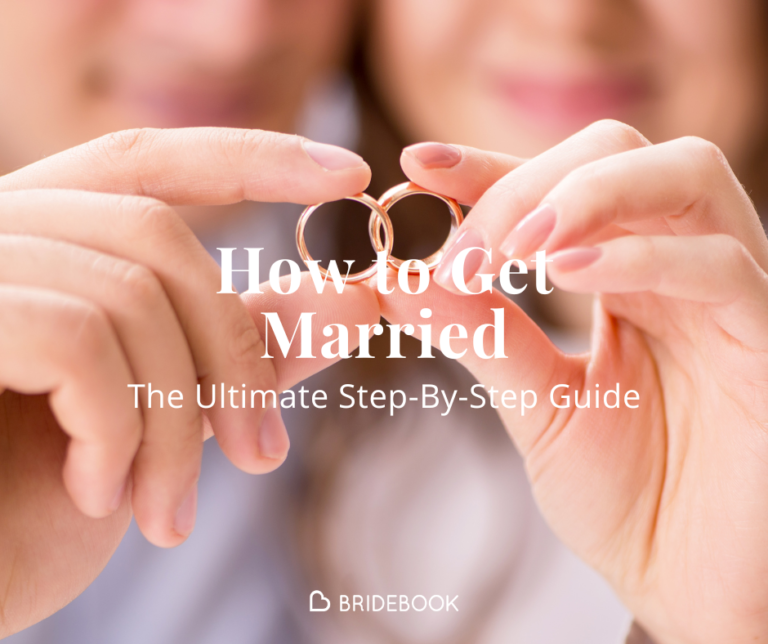
We’ve got a whole post dedicated to which wedding legalities each ceremony requires, whether civil or religious, in terms of both the legal documents required and the religious proceedings. Whatever venue you’re getting married in, whether registry office, place of worship, restaurant or outdoor space, there are certain non-negotiables: giving notice, hiring a registrar, saying your vows, and enlisting two people to witness the all-important signing of the register.
What are the stages to getting married?
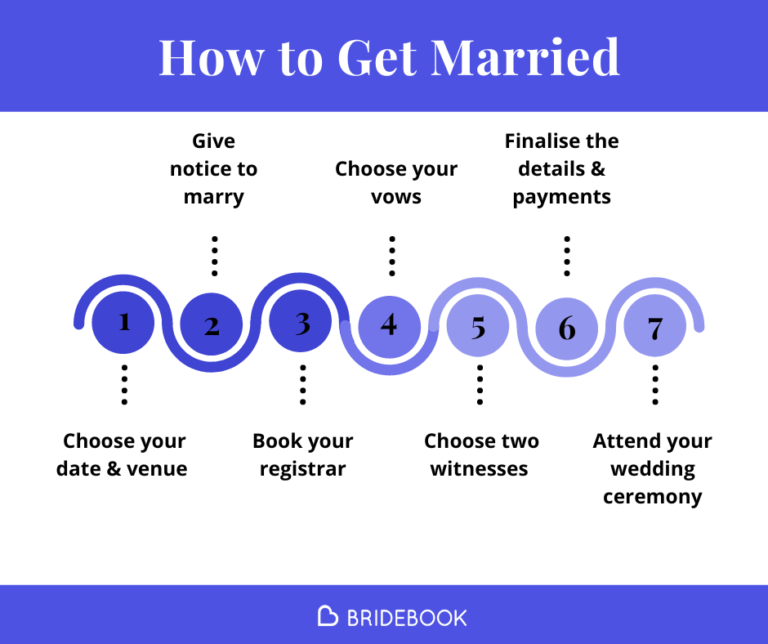
When it comes to just getting married in the legal sense, there are only a few simple steps to be taken, which we’ve summarised below. The process is the same for both heterosexual and same-sex weddings, and regardless of whether it’s your first or fiftieth marriage or anything in between!
- Choose your wedding date and venue
- Give notice to marry
- Book your registrar
- Choose your vows
- Choose two people to be witnesses
- Finalise your plans and payments
- Attend your wedding ceremony
We’ve set out those steps in the handy quick reference infographic above.
However, for most couples, the journey from getting engaged to saying ‘I do’ is a little more complex, and will involve planning a fabulous wedding celebration alongside sorting out the essential legalities. Follow our comprehensive step-by-step guide so you don’t miss a thing, and can get married with peace of mind.
1. Start with the perfect proposal
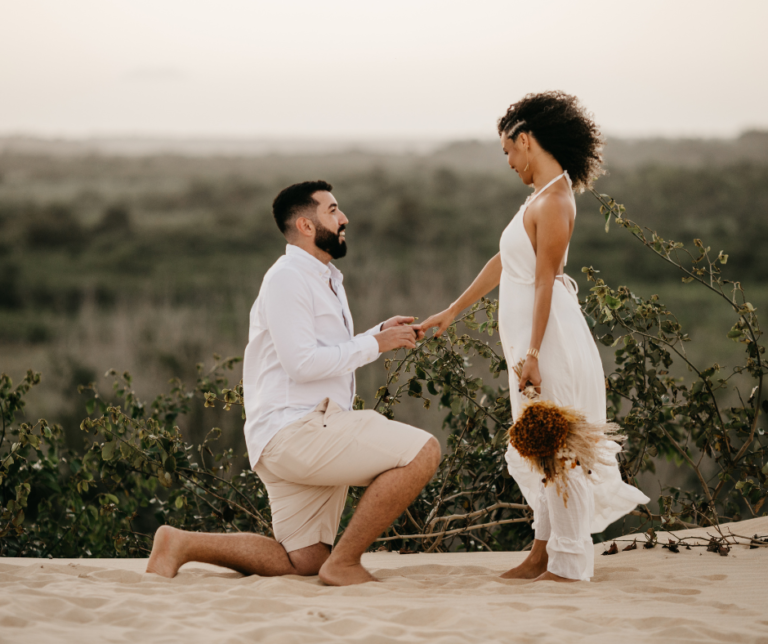
Of course, every marriage starts with a proposal. How you do that is entirely up to you. Will you make a huge romantic gesture, like getting down on one knee at midnight for the perfect New Year’s Eve proposal as fireworks explode, or go for something a little more intimate, like at your favourite woodland spot or as you finish a romantic meal?
However you choose to propose, just make sure it’s true to you and your relationship, paying close attention to what you think your partner will appreciate.
For some inspiration, read our article featuring 15 romantic proposal ideas.
2. Check your eligibility to marry

From the moment you get engaged, it’s easy to get excited and rush straight into planning your wedding. But, unless you’re especially keen to get married on a specific date, try not to go too hard too fast. Enjoy your new-found status as an engaged couple and ease into wedding planning gently. Why not take a trip to celebrate your amazing news? Or, throw an engagement party so you can celebrate while surrounded by your loved ones.
For more information on what to do after you bag yourself a fiance, read our step-by-step guide featuring 20 things to do after you get engaged.
Once you’ve thoroughly celebrated your engagement, you’ll need to check your eligibility to get married, as there are legal rules around this in the UK. You can get married or form a civil partnership in England and Wales if you are:
- Aged 18 or over (anyone under this age will require parental permission).
- Not already married or in a civil partnership
- Not closely related to each other
- A UK citizen or have indefinite leave to remain in the UK (if you or your partner are from outside the UK or Ireland, you might need to apply for a visa to get married in the UK)
3. Work out your budget
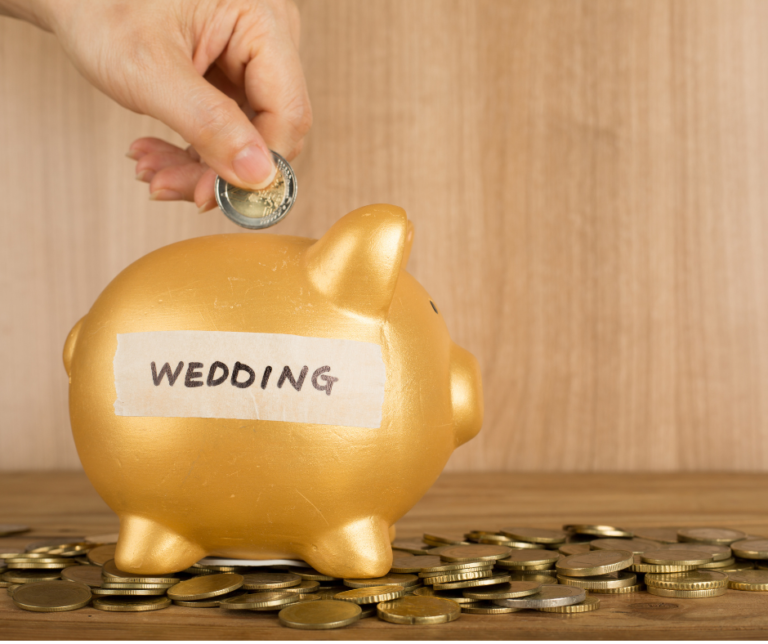
Every couple who gets married has to work out their budget. Whether you have a small budget, a modest budget, or a money’s-no-object budget, you still need to know exactly how much you have to spend. After all, there’s a huge difference between the cost of a registry office wedding and a 200-guest, castle-hosted wedding extravaganza.
It’s not the most glorious part of the wedding-planning process, but it’s one of the most important. Look at your current finances, along with the money you think you can save between now and your ideal wedding date. Only when you’ve got an accurate idea of the money you have to spend can you start properly looking at venues and other vendors. To help you work things out, use our handy wedding budget calculator.
For more information, read our ultimate wedding budget breakdown.
4. Talk to your parents about money
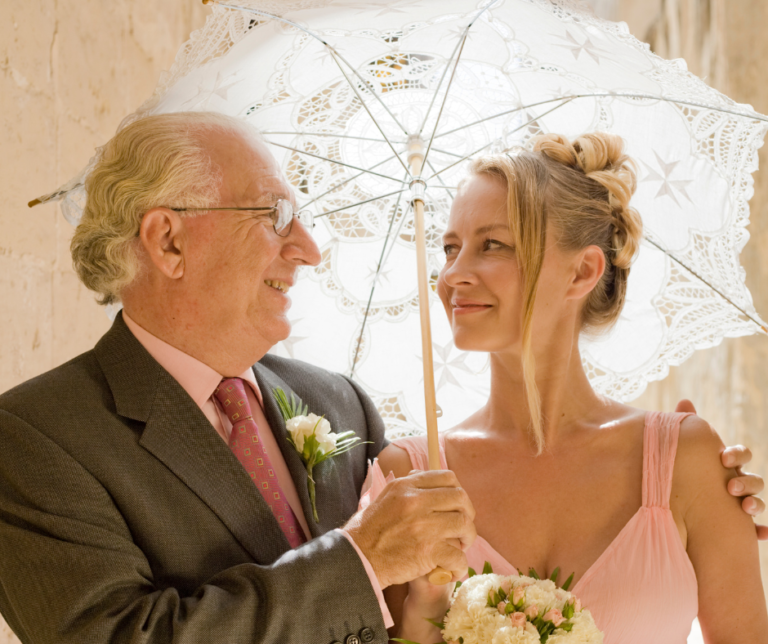
Our 2023 UK Wedding Report found that two-thirds of couples ask family for help paying for their wedding – so there’s absolutely nothing wrong with it. But, if you do plan on speaking to family and asking them to pay for the venue or a couple of vendors, it’s important to do so early. That way, you’ll know what they can commit to and won’t have to make any assumptions or guesses, which can complicate things if they don’t turn out how you’d hoped.
For tips on how to broach the subject, read our guide on how to ask your parents for help paying for your wedding.
5. Think about your wedding ceremony
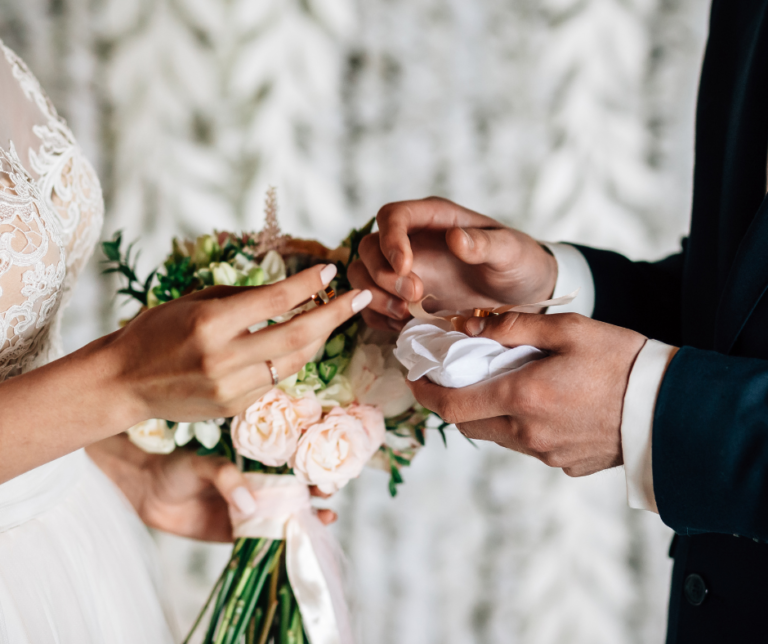
You should decide early on what type of wedding ceremony you’d like to have. If you have religious beliefs, you might prefer to have a Catholic wedding ceremony or Hindu wedding ceremony. If not, you could have a non-denominational wedding ceremony or traditional wedding ceremony.
If you have a strict budget or you’re not interested in having a big wedding, you may choose to have a registry office wedding ceremony instead.
The type of ceremony you go for depends entirely on your beliefs, preferences and budget. Remember, there’s no right or wrong answer – only what’s right for you.
To find out more about the different types of wedding ceremonies, read our ultimate wedding ceremony guide and ultimate wedding ceremony order guide.
6. Think about your wedding breakfast and evening reception
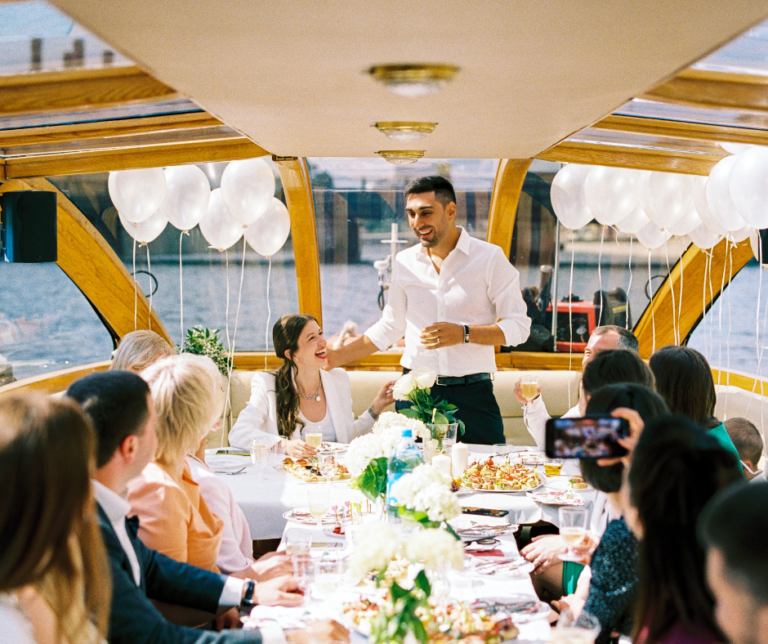
With your budget more or less set, you’ll also be in a great position to decide whether you’d like to have a wedding breakfast, including a three- or four-course meal, or head straight into the evening reception. Or, you may choose to have neither – or both. Again, it all depends on your budget and what your perfect wedding day looks like.
Once you know what you’d like out of your big day, you can start thinking about planning it!
7. Choose your wedding date

There are a thousand different reasons why you might choose to have your wedding on a particular date. Perhaps you’d like to choose a date for symbolic reasons, like the date you first met. Or, maybe it’s for religious or spiritual reasons. Or, maybe it’s even for budgeting reasons – for example, Tuesday is the cheapest day of the week to get married.
Once you have a date in mind, you can start looking at venues. But, if you find the perfect venue and it’s within your budget, just be prepared to negotiate or have a little wiggle room. If it’s a popular wedding venue, there’s every chance other couples will have got there first and your chosen date might not be available.
For more information, read our article on how to pick your wedding date.
8. Decide whether you want to hire a wedding planner

Before you book your venue or throw down a deposit on a single vendor, make sure you and your partner have decided whether or not you’d like to hire a wedding planner.
Wedding planners can be rather pricey – around 10% of your overall wedding budget. But, the cost is often more than worth it, thanks to their ability to spend time searching and negotiating, as well as the relationships they’ve already established thanks to years of working with popular venues and vendors within the industry.
Half the fun of getting married is planning your wedding, but if you don’t have the time, patience or inclination, a wedding planner can make it a heck of a lot easier. Just make sure you decide early on if it’s the right choice for you, because you’ll only see their true value if you haven’t already booked everything beforehand.
9. Think about your theme and colour scheme

As part of the vision you have for your wedding, before making any kind of bookings you’ll need to have a clear idea of your theme and colour scheme. That could be something rustic and natural, sleek and modern, floral and elegant… you might even have something super unique and massively personal to you, like a book theme or subtly nerdy fantasy theme. The theme and colours you decide on can then have a huge influence over the venue, decor, stationery, food and more.
10. Put your wedding checklist together
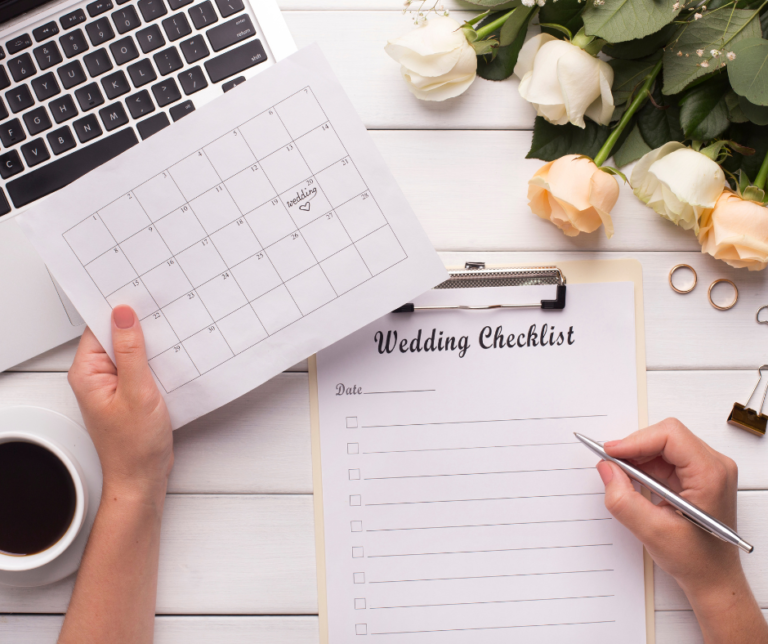
Only you (or your wedding planner if you have one) will know exactly what you want from your wedding, from vendors to colour schemes and everything in between. But even then, with so many things to keep on top of, there’s every chance that one or two things will get left behind, or – worst case scenario – forgotten about completely.
That’s why it’s important to put together a wedding checklist early, which you can add to and check off as you go. To make things easier, we have a wedding planning checklist tool that you can access for free and make changes to whenever you need. And for some inspiration for what you might want to include on your checklist and when you might want to aim for checking it off, read our ultimate wedding planning checklist guide.
11. Be open and honest with each other

A big part of getting married is always being open and honest with your partner. Agree to talk to each other about everything and anything, no matter how big or small they might be. Like with a marriage, wedding planning is also about communication, so make sure you do plenty of it. It’s a fun process, but it’s also long and might get a little tricky at times – most of the time, though, it’s nothing that can’t be overcome with a few frank chats about what’s really on your mind.
12. Find your perfect venue
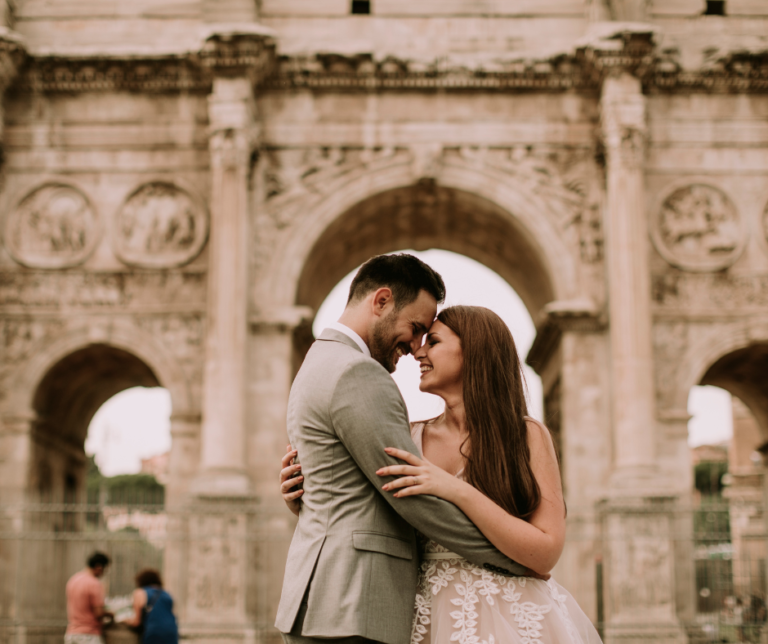
Once you know what you want from your wedding and how much money you have to help make that happen, you can start making reservations, signing agreements and throwing down money on deposits.
The biggest single cost of your entire wedding day will be your venue. And without it, the rest of your wedding day can’t happen, so make it your priority to find and secure your dream venue as soon as possible. Whether it’s a hotel, registry office, place of worship, stately home, castle, restaurant, golf club, garden or anything else you might think of, get your name down for your chosen date and secure it for yourselves. The more popular the venue is, the more likely it is that it’ll be snapped up quickly – sometimes, you might need to book it up to two years in advance.
If you’re choosing to get married in a place of worship, it’s unlikely that you’ll also be able to host the wedding breakfast and/or reception there, too. So, if you’re having multiple venues, you’ll need to make sure they’re all available on the same date.
For help making one of the trickiest decisions you’ll come across when getting married, read our article featuring our top 10 tips for choosing your wedding venue.
13. Put your guest list together

With your venue secured, you’ll know how many guests it can accommodate, so you can start thinking about your guest list. If you’ve gone with a smaller venue, this might mean making a few tough calls on those distant cousins you only see every few years, or restricting the number of plus ones you dish out.
For help and advice on this tricky topic, read our introduction to your wedding guest list.
14. Hire the rest of your vendors
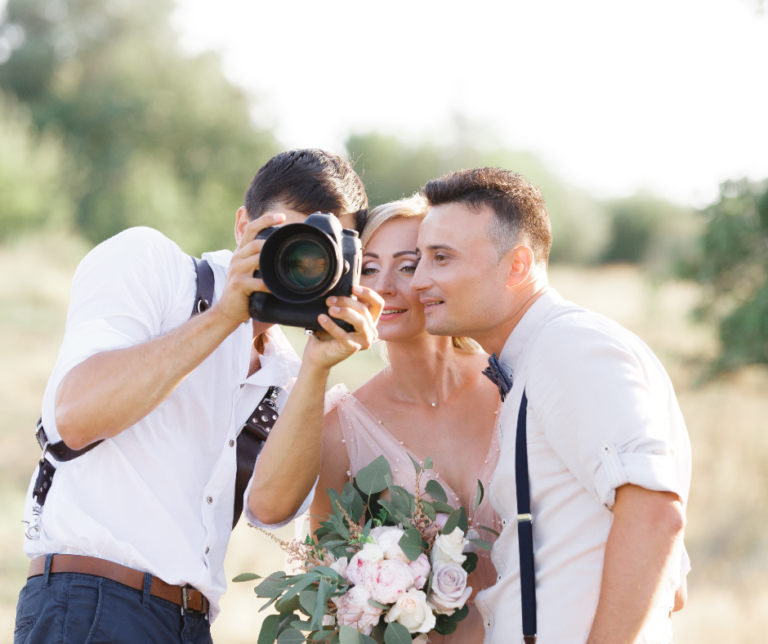
It’s time to start researching, meeting with and booking the rest of your wedding day vendors, who’ll all come together to create the overall vision you have for your big day. These include:
- Photographer
- Videographer
- Caterers
- Cake makers
- Entertainers
- Musicians
- Florists
- Decor
- Hair and beauty
- Attire
- Stationery
- Celebrants
- Transport
- Marquee hire
And that’s not even all of them. Make sure you leave yourself with plenty of time, because you’re going to be browsing a lot of wedding supplier profiles, sending a lot of messages, and meeting with a lot of people.
15. Choose your wedding attire

Many couples choose to get married in traditional wedding attire, whether it be a suit, bridal gown or something specific to their culture or background. But, you might choose something else that’s in keeping with where you’re getting married and the theme. For example, if you’re getting married in the middle of a forest, a bridal gown with a long train might not be the best choice – just think of all the leaves and twigs!
16. Give notice to marry
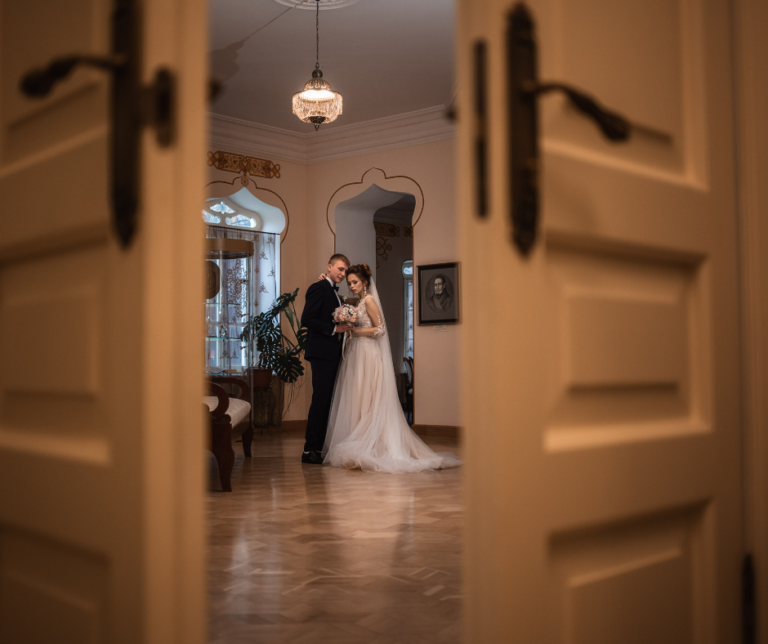
When there’s less than a year to go until your wedding, another critical stage must be met, which is when you and your partner give notice that you intend to get married. To do this, you must speak to your local register office and sign a statement, which is done at least 28 days before your wedding day, but no more than 365 days ahead of your big day.
Make sure both you and your partner go to the register office in person, and take with you a valid form of ID and proof of address. You’ll also need information related to the date, time and location of your wedding. If you’ve been married before, you’ll also need to provide evidence of your divorce or your former partner’s death certificate.
There is a small fee for giving notice, which can differ between different local authorities, but is generally around £35 per person.
17. Book your registrar
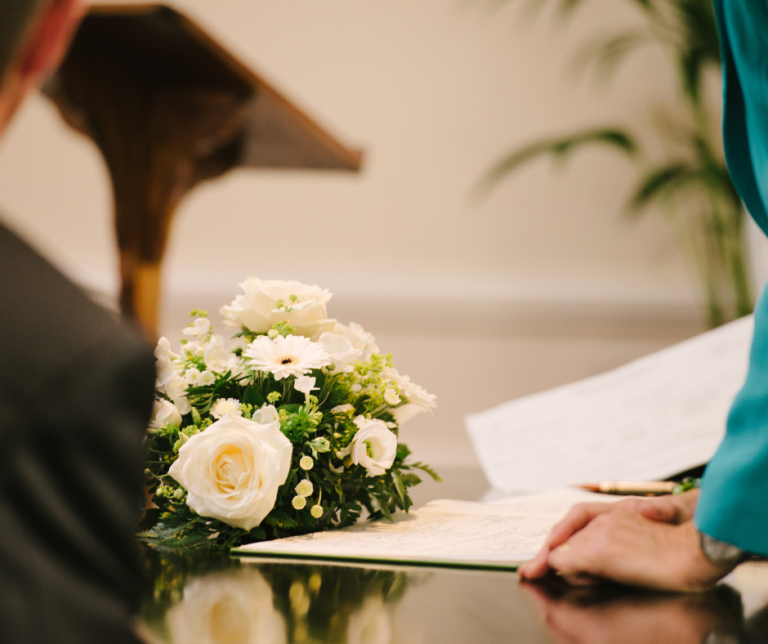
In the UK, religious weddings aren’t legally recognised unless a registrar is present. If there isn’t one, then your marriage won’t be bound by law. Many places of worship have a registrar to make sure your marriage follows the correct legal processes, but some may not, and if this is the case then you’ll need to book the registrar as well.
Many religious wedding ceremonies follow a set structure or contain cultural or religious rituals and traditions, so it might not be possible for you to have a registrar there on the day. If you’re not sure if this applies to your ceremony, speak to the head of your place of worship or the religious leader who’ll be officiating the ceremony. It may be that you’ll have to visit a registry office around a week or so before the religious ceremony (along with two witnesses) to have a small, private civil ceremony to ensure your marriage is legally binding. Some couples also choose to do this after the religious ceremony.
18. Choose your vows
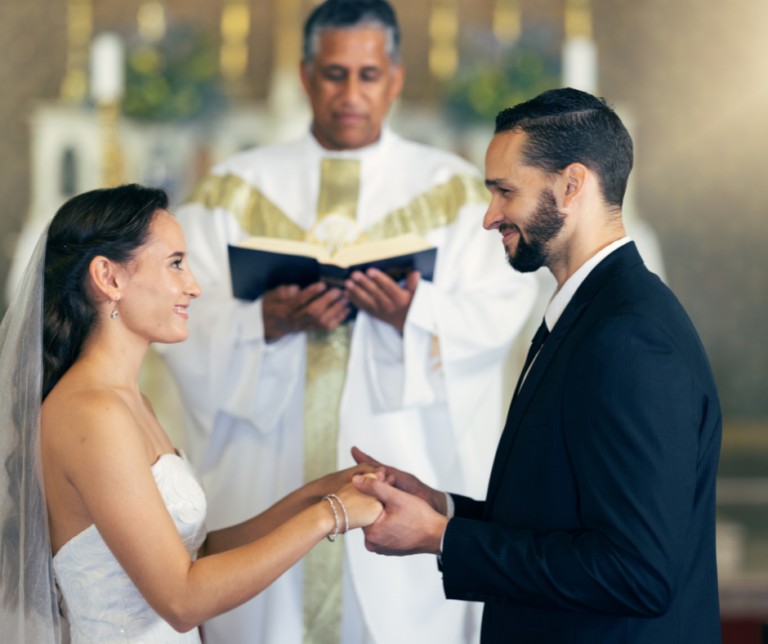
As well as being a promise to your partner and a hugely symbolic gesture, a wedding ceremony is also a legal process. That means, like with any legal process, there are certain steps that must be followed – if they’re not, your marriage won’t be valid.
There are two crucial parts to the words you say at your wedding: the declaratory words and the contracting words.
The declaratory words tell the registrar, witnesses and guests that you don’t know of any reason why you can’t legally get married. The contracting words are the words you speak or agree to that finalise your marriage – a popular response to the contracting words are I do.
But, if the type of ceremony you’ve chosen allows for personalisation, you may choose to write your own vows. Writing your own vows can be tough, but the only person who can express how you truly feel is… well, you. If you feel confident enough, this may be something you choose to do, but if it’s not, that’s fine too. There’s no right or wrong option.
19. Choose two people to be witnesses

We’ve already touched on this, but as part of the legal process, you need to have two adult witnesses at your wedding who are happy to sign the marriage register to say they were there to witness the two of you get married.
It’s a symbolic gesture and super easy to do, but it’s not something you’ll want to spring on someone the morning of the wedding, so make sure you ask them in plenty of time. The only prerequisites are that they must be capable of understanding what’s taking place, which also means they have to have a solid understanding of English.
20. Book your dream honeymoon

Whether it’s immediately after the wedding or a few months down the line, a honeymoon is a non-negotiable for the majority of couples. If it’s something you plan to do a couple of days after the wedding and your budget allows for it, make sure you don’t book it too late. Yes, it’s another cost, but you’ll avoid possible disappointment if you get it booked sooner rather than later.
21. Finalise your wedding plans and payments
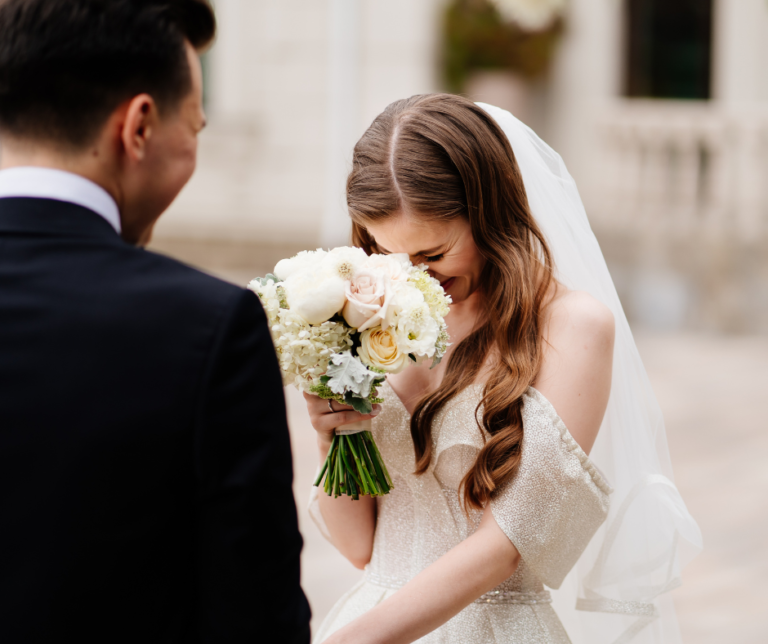
Use your wedding planning checklist tool to track invoices and payments so you don’t miss any deadlines. The last thing you want during the last few remaining weeks and days before your wedding is for a vendor to cancel your booking because you forgot to pay your final invoice.
Just like Santa Claus, you’ll want to check your list twice (or even three or four times), so nothing gets forgotten or overlooked.
22. Enjoy the build-up to your marriage
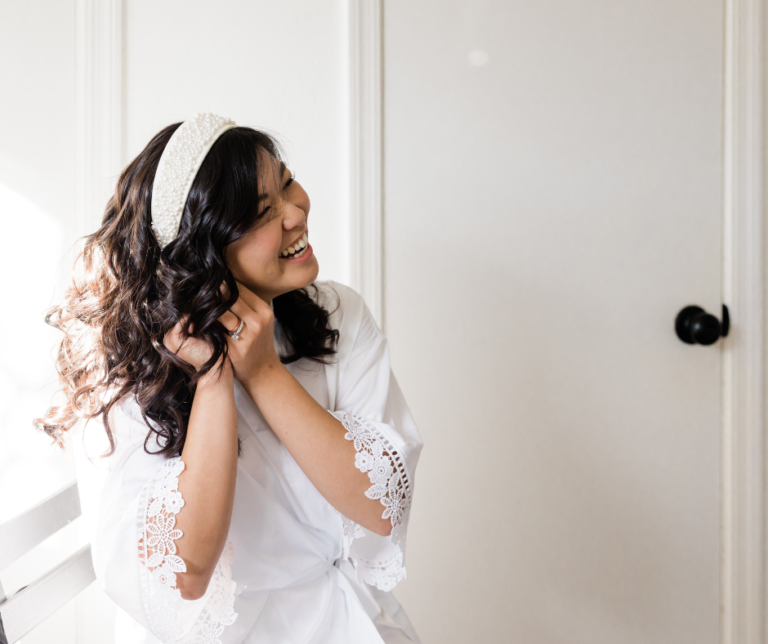
Planning your wedding is a lot of work, and with so many things to keep on top of, you might feel a little stressed or under pressure at times. But, it’s important to savour the moment and enjoy yourself. You’re probably never going to throw a party of quite the same magnitude again, so make sure you take a little time for yourself, and lap up the love and attention you’ll get from your family and friends.
23. Attend your wedding ceremony
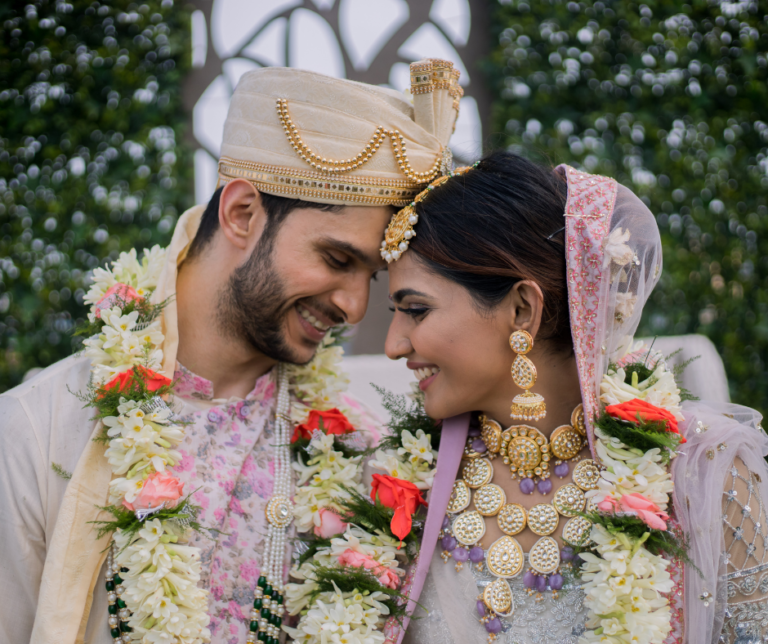
By the day of the wedding, there should be nothing else left to organise, and the professionals you’ve hired to help make your day special will know exactly what to do.
The most important part of the day is the ceremony itself, specifically the declaratory and contracting words. Don’t be tempted to say ‘no’ as a joke – it’s a legal declaration so you have to follow the instructions given to you by the registrar if you want everything to go ahead and be valid.
Then, once you’ve signed your marriage certificate (along with the registrar and witnesses), everything is done and you’ve suddenly bagged yourself a spouse!
That’s all there is to it, really. Your wedding day will go by as quick as a flash, so take plenty of mental (and actual!) pictures and have fun.
24. Make your marriage known
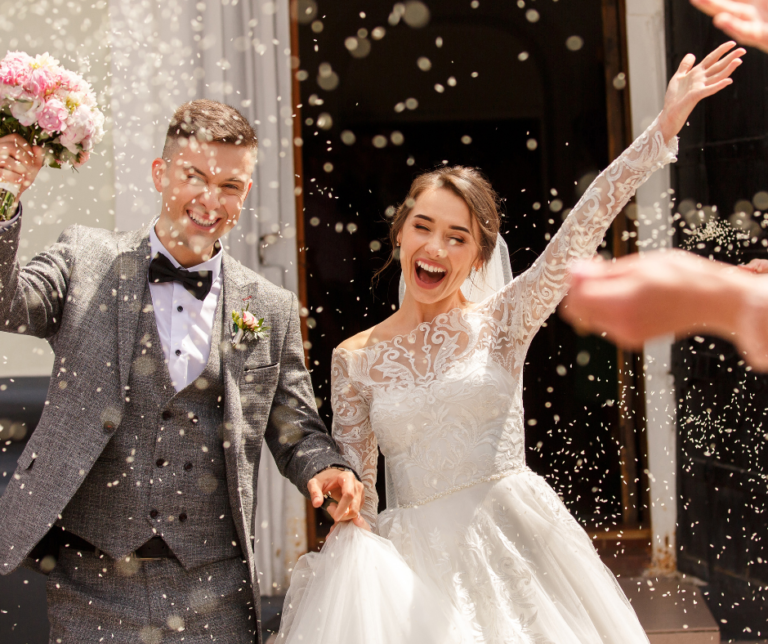
Once you’re married, it’s time to enjoy your life as a newly married person! All the legal stuff is over and done with, but if you changed your surname you’ll want to let businesses and authorities know about it, like your bank, insurance providers, DVLA and others. HMRC and other authorities will also need to know about your marriage as this can have an impact on the tax and benefits you pay and receive – so don’t delay and get yourself in hot water, because you might end up with an unexpected tax bill later down the line.
Plan your perfect wedding with Bridebook
Are you wondering how to get married and plan your ideal wedding? Sign up to Bridebook today to access all the tools, tips and information you might need to make it happen.
Browse other similar articles…
- The Ultimate Wedding Planning Checklist
- The Ultimate Wedding Ceremony Guide
- The Ultimate Wedding Ceremony Order
- The Ultimate Wedding Budget Breakdown


